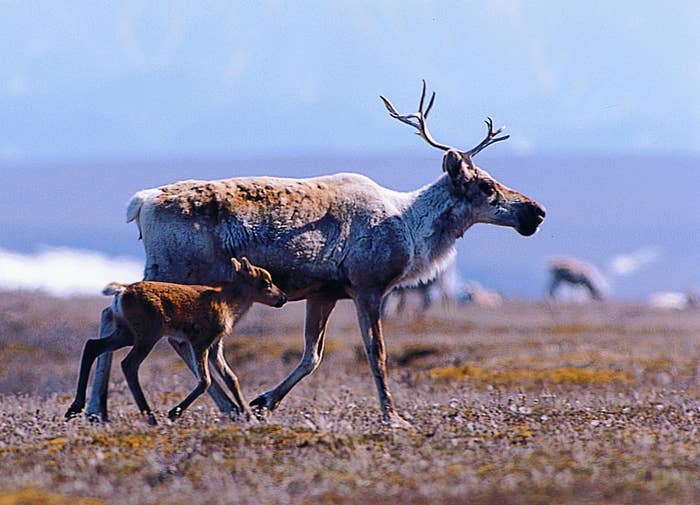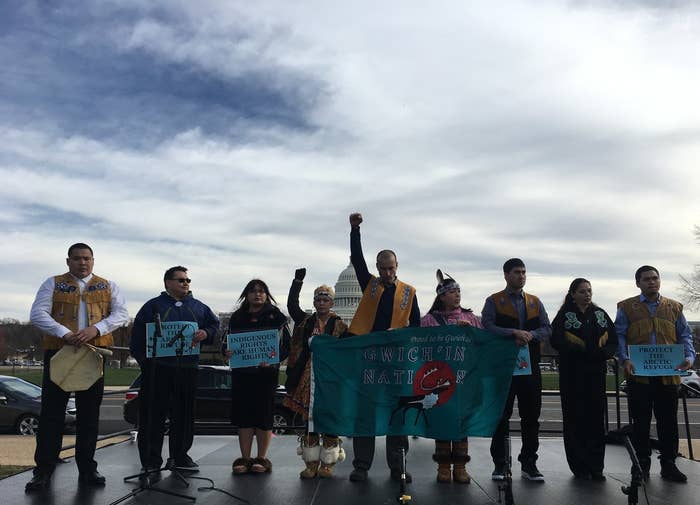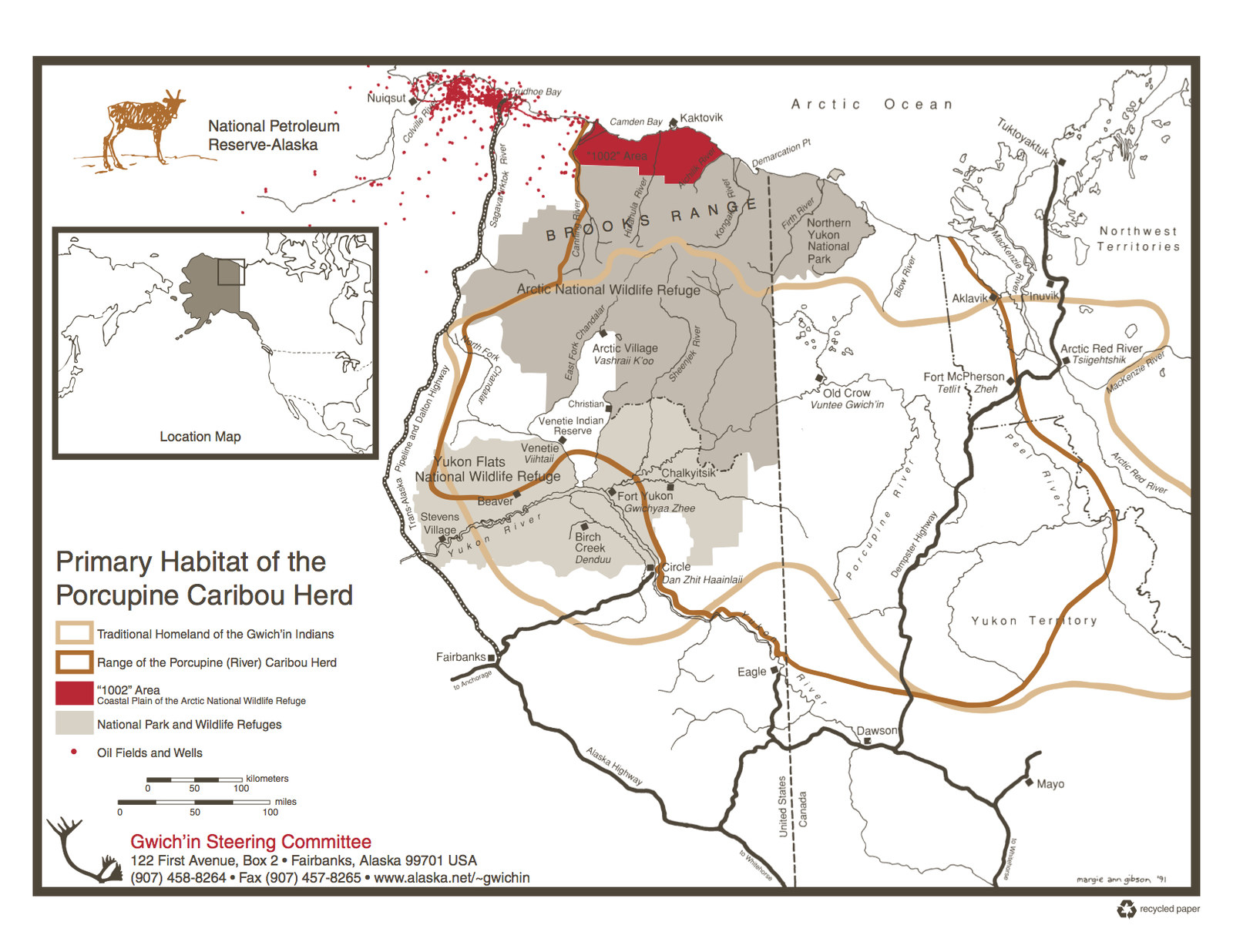
Alaska Natives rallied in Washington, DC, on Wednesday to denounce a Congressional proposal to drill in the Arctic National Wildlife Refuge, a last-ditch attempt to save a region rich in history and wildlife.
“They are making decisions down here in Washington, DC, that are going to affect our future — people that will never understand our way of life,” Bernadette Demientieff, executive director of the Gwich’in Steering Committee, said. “Please stand with us, and please help us stop this bill.”
The controversial bid to open up 1.5 million acres of coastal plains in the 57-year-old Arctic refuge to oil and gas drilling was tucked into the massive Senate tax bill that passed early Saturday morning. But it was not included the House’s tax legislation that passed in November, and will be up for debate when both chambers hammer out a final tax bill in the coming weeks.
Sen. Lisa Murkowski and other Alaskan Republicans have tried to get drilling in the refuge for years, and this is the closest they’ve come in more than a decade. "I plan to do everything that I can to make sure that the promise to Alaska is fulfilled and they open up ANWR," Murkowski told reporters last Friday. She is on the conference committee tasked with merging the House and Senate tax bills.

After the rally, the group of visiting Alaska Natives spent the afternoon on Capitol Hill meeting members of Congress. Demientieff, of the Gwich’in Steering Committee, said the group had plans to petition more House members on Thursday, and had yet to meet Sen. Murkowski as of Wednesday evening.
The bill directs the Interior Department to put two leases up for sale — each for at least 400,000 acres in the coastal plains — in the next seven years. There are some restrictions for the leased areas: Only 2,000 acres of the surface (not including roads) can be disturbed by production and support activities, such as airstrips and legs to hold up pipelines.
But since there are no instructions or limits on future lease sales, it is possible more of the 1.5-million-acre coastal plains could be sold in the future. The refuge’s remaining 17 million acres and more would remain off limits to drilling under this bill.
The goal is to generate revenue to help support Alaska and reduce the federal deficit. This proposal, along with one to sell more publicly owned oil from the Strategic Petroleum Reserve in Texas and Louisiana, is expected to raise $1 billion in revenues over 10 years, Nicole Daigle of Murkowski's office wrote in an email to BuzzFeed News. (In November, Murkowski’s office had said Arctic refuge drilling could generate $1 billion alone.)
The coastal plains, in the northeastern part of the state, teem with land mammals in the summer. Polar bears and porcupine caribou head there to den and calve. The region is also a migratory stopover point for some 200 bird species.
Conservationists worry that the move will threaten an ecosystem in delicate balance. Native people who have coexisted with the 197,000-strong porcupine caribou herd, and relied on the animals as a resource, are concerned the plan will wreck traditions that go back thousands of years.
“Those caribou and that land is a sacred cultural tie. If that was to be taken, our way of life would also be taken. Our human rights and cultural livelihood depends on this,” Adrienne Titus, a member of the Inupiaq community in Alaska, said.

Jeffrey Peter, a First Nation member of the Vuntut Gwitchin, travelled 12 hours from Old Crow, a community of about 250 in the Yukon, to join the rally. He told BuzzFeed News that threats to porcupine caribou on the US side of the border will affect communities like his, elsewhere along the caribou’s migratory path. “It’s an international issue, it always has been,” he said.
Indigenous Alaskans across the state are seeing crop yields change and communities eroded by global climate effects. Researchers expect caribou already feel the change. “Alaska is ground zero for climate change right now,” Demientieff, of the Gwich’in Steering Committee, said. “The last thing we need is more oil development.”
Democratic Senators Elizabeth Warren of Massachusetts, Tom Udall of New Mexico, and Jeff Merkley of Oregon, joined the rally and said they supported the cause. Rep. Alan Lowenthal, of California, also met the group on stage. “This is one of the crassest exploitations of this planet ... and we are not going to stand for it,” he said.
The fate of this proposal, however, likely falls to Republicans in Congress, who control both the House and Senate. Twelve Republicans in the House last week sent letters to the leaders of both chambers opposing drilling in the Arctic refuge, arguing the estimated fossil fuel reserves were small and the potential for litigation was high. However, it’s unclear if their criticism of this proposal would keep them from voting for the tax bill as the pressure mounts for Republicans to deliver a legislative victory to President Trump.
“The politics really work against us,” Athan Manuel of the Sierra Club told BuzzFeed News, but “we’re going to keep pushing and pushing and see if we can have it taken it out.” The Sierra Club, the League of Conservation Voters, and other environmental groups are all actively courting Republicans on this issue.
UPDATE
The terminology for referring Alaska Natives in this post has been updated.


